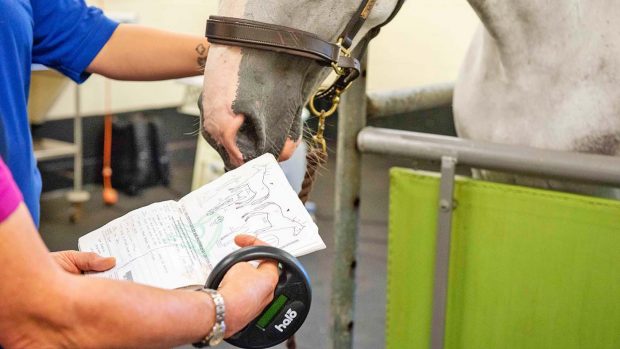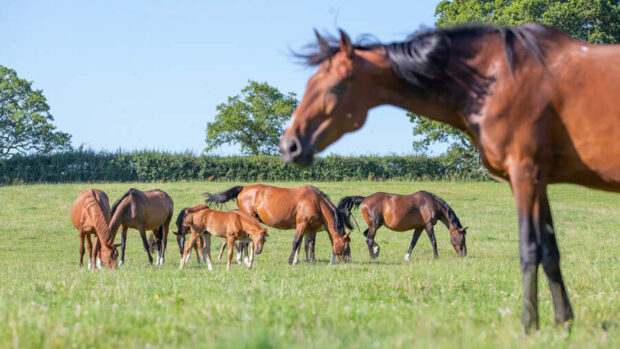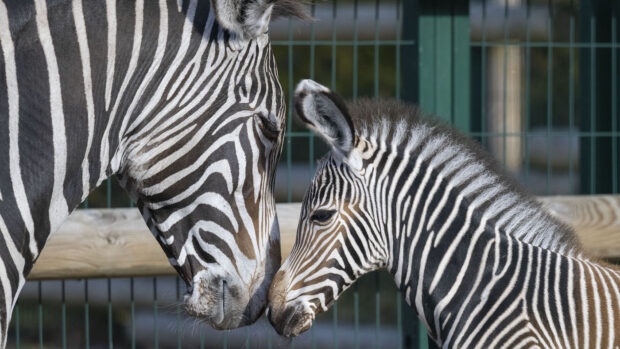Bonding
At the Avenue Riding Centre at Malvern, Worcs, Sheila Whelan believes that the first 45 minutes of a foal’s life is the time when she can “desensitise” him for every thing he will have to confront.
Sheila, who breeds and trains American Quarter horses for Western and English riding, as well as racing, stresses that she never interferes with the bonding between mare and foal.
In some ways, the youngster’s education starts before birth in that Sheila makes sure that the mares accept and trust her.
“The mares are happy for me to handle them all over,” she says. “They have to be happy in your company and trust you to be with the foal.
“When the foal is born, I’ll touch him all over his body in little circular movements, massaging rather like one horse nuzzling another. I’ll rub his ears and down his legs even before he gets up.
“A foal is able to take everything in by the time he’s an hour old. He has to survive – like a deer, he’s a fear/flight animal.”
Early education
Sheila, who runs handling and riding courses called Natural Horsemanship, says that early handling has produced such good results that she is going to take it one step further by accustoming newborn foals to the sound and vibration of small clippers held against them.
“All the things a horse finds alarming as he gets older, you can introduce and desensitise him to as a foal,” she says. “Crackle sweet papers round him, tap his feet with hammers and bring his legs forwards as the farrier will.
“You don’t leave a child’s education until he is a wilful teenager. So why do the equivalent with a horse by leaving him until he is a three-year-old?”
Sheila believes that all horses need leadership, but that it should be based on respect gained through fair treatment.
“The hierarchy of the herd should translate to the handler being the number one, the ultimate horse. But to gain their respect, you have to treat them fairly. You can’t do it by fear. Horses are not aggressive, it’s people who make them that way.
“That doesn’t mean I let them get away with things. I’m a disciplinarian, but in a fair way. You have to understand things from the horse’s point of view, as well as your own.
“You may decide to do something at a particular time and perhaps the weatheris bad or something else interferes. If you can’t achieve what you set out to do, it’s no good losing your temper – the horse can only learn when he’s relaxed and receptive.”
Importance of individuality
Sheila says it is important to treat horses as individuals, right from the start.
“You have extroverts and introverts, just as you do with people and dogs, but there is no such thing as a nasty foal.”
Sheila’s foals are led and handled equally from both sides. “Too many people do everything from the same side, so the horses become one-sided,” she says. “We deliberately teach them to be led behind us so that we are literally the leaders.”
All foals are taught to go in trailers before they are five months old.
“The mare stands at the side or goes in ahead, and we lead them in and take them back out again. There’s no stress involved and they simply accept it.”
She prefers to start training early and make gradual progress, rather than telescoping education into a horse’s third and fourth years.
“Things are so much easier if the horse has been handled from the start and sat on as a two-year-old. We don’t ride them, simply teach them to accept humans on their backs.
“Then we do a bit morewhen they’re three, and by the age of four, they’re ready to go on. The trouble is that so many people want to do everything in five minutes when they get to four years old.”
For information, send an SAE to Natural Horsemanship Courses, The Avenue Riding Centre, Hanley Road, Malvern, Worcs, WR14 4PH.



